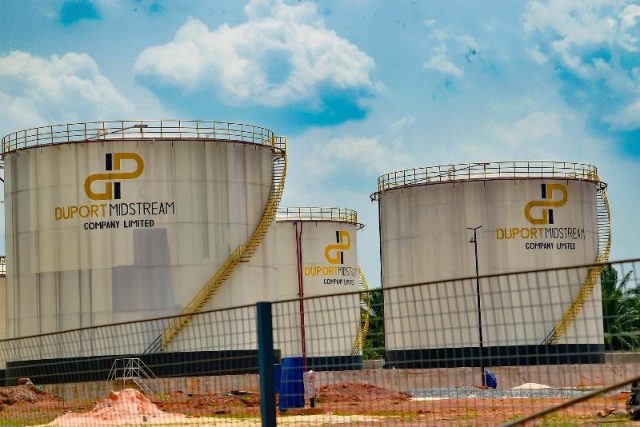…DCA involves domestic sales of crude oil, thereby bringing revenues in Naira, the domestic currency.
…DCA notable weakness-a flawed pricing framework.
…Agora Policy is a think-tank committed to finding practical solutions to urgent national challenges, conducts policy research, facilitate frank and purposeful dialogue, and build capacity for governance, policy and advocacy.
TUE, JAN 30 2024-theGBJournal| ”Of all the options being implemented or considered for boosting forex inflow into Nigeria, cancelling what is termed Domestic Crude Allocation (DCA) is Nigeria’s surest bet,” says Agora Policy, a Nigerian think tank and non-profit in their latest research on Nigeria’s forex challenges titled ‘Cancelling Domestic Crude Oil Allocation is Nigeria’s Surest Path to Easing Forex Supply Crunch’
”This will yield immediate result and provide a steady (not one-off) flow of foreign exchange—and thereby address the cashflow challenge in the official segment of the forex markets.
Additionally, it will end the dodgy deductions and accounting associated with the domestic crude allocation policy that has been aptly described as an active crime scene,” says Agora Policy.
Analysts hail the Agora policy research as one of the most evidence-based argument on how Nigeria can end its current struggle with the severe crunch in the supply of foreign exchange (forex), which negatively impacts the value of the Naira, its national currency.
Agora Policy is a think-tank committed to finding practical solutions to urgent national challenges, conducts policy research, facilitate frank and purposeful dialogue, and build capacity for governance, policy and advocacy.
DCA Explained
DCA involves domestic sales of crude oil, thereby bringing revenues in Naira, the domestic currency.
Depending on the terms of the different production arrangements, crude oil produced in Nigeria is shared between the oil companies and the Federation. NNPC is responsible for selling the Federation’s share of the total oil produced.
NNPC in turn allocates the Federation share either for exports or for domestic utilisation. It is the component for domestic utilisation that is referred to as domestic crude allocation (DCA).
The critical point to note is that the different allocations are paid for in different currencies: revenue from Federation exports is received in dollars and revenue from DCA is received in Naira.
With the dwindling oil production, a larger proportion of the Federation’s quota has increasingly been channelled to DCA.
This has led to the situation where most of the oil revenue inflows have been in Naira, as opposed to dollars.
”It is our considered position that switching crude oil allocations from the DCA to exports will provide steady revenue in foreign exchange, and thus boost foreign exchange supply in Nigeria.”
Ultimately, an increased and steady supply of foreign exchange will ease demand pressures and help to stabilise the Naira.
The Think-tank argues that the DCA has acquired an outsized profile of recent, and says any serious attempt at understanding and reforming how Nigeria’s share of oil is accounted and paid for must, for a number of reasons, zero in on the management of and the recent prominence of the DCA.
Agora Policy notes that With the drastic reduction in oil production in Nigeria and the shift in production arrangements away from Joint Ventures (JVs) to Production Sharing Contracts (PSCs), most of the Federation’s share of crude oil produced in Nigeria is channelled to DCA, which has dramatically risen from below 10% of Federation’s share of oil in the early 2000s to almost 100% by 2023.
”This is not just a suboptimal allocation issue. In relation to forex flows, it is a key challenge because the revenue from DCA sales is received in Naira, meaning that the Central Bank of Nigeria (CBN) is starved of steady and healthy flow of foreign exchange from what used to be its dominant source: crude oil sales,” it says.
As at 2010, flows from oil and gas accounted for 94% of forex to the CBN but plummeted to 24% by June 2022, and is conceivably much lower now (CBN, like NNPCL, has stopped disclosing some critical data).
Crucially, the DCA policy not only provides an insight into why the national oil company failed to make remittances to the Federation Account for a long spell but also explains why forex inflows from sales of Federation’s crude oil dwindled and the country’s external reserves stagnated at a period of historically high oil prices.
DCA notable weakness-a flawed pricing framework.
On the one hand, the crude from the DCA was sold to the PPMC at an implied discount in dollar terms, when adjusted for the exchange rate, in comparison to the international market.
On the other hand, the Naira sales price for refined products was delinked from Naira cost price to PPMC implying a subsidy whose bill was to be covered in annual budgetary allocations.
In essence, the DCA created two layers of potential losses: first to the Federation in terms of potential export revenues and second to external reserves in the form of forex inflows. In addition, in de-linking domestic petrol prices from the underlying cost drives of refined petroleum products, the DCA pretty much created an incentive for the expansion of Nigeria’s petrol subsidy programme.
The failure to incorporate the opportunity cost concept in economics would have dire implications further down the line for fiscal revenues and dollar proceeds while creating perverse incentives for malfeasance.
In what follows, Agora Policy highlight some of the critical problems of the DCA.
Firstly, the losses borne by the PPMC provided little legroom to make the required investments in Nigeria’s domestic refineries which gradually fell into disrepair.
Nigeria’s domestic refining capacity fell to low digits with zero allocation to the refineries from the DCA in 2020. While the loss in domestic refining capacity should have resulted in a termination of the DCA policy, successive Nigerian governments, desirous of ensuring low domestic fuel prices, responded by using the DCA barrels to enter into different arrangements (such as swap, offshore processing arrangements and direct sale and direct purchase) with international refineries and commodity traders to basically barter crude for refined petroleum products.
For much of the earlier period, the actual DCA arrangements amounted to sacrificing an insignificant share of Nigeria’s oil production for refined petroleum products.
Given relatively tepid international oil prices for the much of the 1990s and early 2000s, the arrangement was not burdensome from a fiscal and FX perspective.
Importantly, DCA usage was below 10% of the total Federation share of oil. However, by 2005, the decision to allocate about 445,000 barrels per day to DCA bumped up significantly the share of the Federation oil allocated for domestic consumption.
In 2004, for instance, only 39 million barrels or 8.57% of the 455 million barrels of the Federation share was allocated to domestic consumption, with the remaining 91.43% allocated to Federation exports.
Following the policy mentioned earlier, the picture changed dramatically in 2005, with 160.9 million barrels or 35.25% of Federation’s share of 456 million barrels set aside for domestic consumption.
The percentage devoted to DCA has steadily increased since then. In the early stages, NNPC refined some of the allocation locally, swapped some for refined products abroad, and exported the rest, which it paid for in dollars.
Before long, things went downhill. The refineries basically collapsed, the crude for domestic consumption was all refined abroad or bartered, upfront deductions by NNPC from DCA increased, and the petrol subsidy programme soared.
Since 2016, DCA crude has been increasingly sold through the Direct-Sale Direct-Purchase (DSDP) arrangement. While the refineries no longer receive crude oil, the DSDP arrangement ensures that crude oil receipts are still in Naira, as opposed to dollars.
Second, the larger proportion of revenue from DCA was largely retained by the NNPC, meaning that the Federation progressively received less and less. Revenue from the DCA has been used by the NNPC for many years to finance its operations.
Payments for subsidies, pipeline repairs and maintenance, product losses and lately JV cost recovery are financed with DCA receipts. In January 2020, total deductions as a percentage of domestic crude oil revenue were 75% (Figure 5). This fell and reached 24% in August 2020.
However, it started rising and reached 100% in March 2022. With the exception of July 2022 when it fell to 89%, it remained at 100% until October 2022.
This implies that all revenues from DCA were retained until October 2022, which also coincided with when NNPCL stopped making remittances to the Federation Account.
The implementation of the Petroleum Industry Act (PIA) resulted in changes to the composition of deductions, leading to its percentage as a share of domestic crude oil and gas revenue falling to 15% in March 2023, before rising to 46% in May 2023.
Reporting of deductions ended in June 2023. The implementation of the PIA, coupled with removal of petrol subsidies, likely reduced the burden of deductions.
Conclusion
We have conducted an analysis of the rapid depreciation of the Naira in recent years. The central theme is that the supply of foreign exchange has not been able to meet up with its demand, leading to a backlog of foreign exchange obligations estimated at between $4 billion and $7 billion.
With oil exports acting as a major enabler of foreign exchange inflows, the nation’s dwindling oil production was identified as an important contributor to lower supply of foreign exchange.
With lower oil production, higher proportions of the Federation’s share of crude oil have been allocated to domestic crude sales. Revenue from domestic sales is received in Naira, as opposed to dollars, thereby heightening scarcity of foreign exchange.
We submit that the DCA has outlived its usefulness, and its continued use has proved costly to the country, especially for inflows of foreign exchange, thereby hurting the Naira.
We recommend ending the DCA and selling Federation’s crude oil for exports, or if sold domestically to private refineries, to be sold in dollars. If this is done, steady inflows of foreign exchange will boost supply of foreign exchange, provide some quick wins to address foreign exchange scarcity, and help to maintain some level of stability for the Naira.
In October, the Federal Government announced plans for the injection of $10 billion of foreign exchange inflows. These are expected to materialise from a variety of sources.
Two executive orders were signed by the president in October: the first one will enable dollar-denominated instruments to be issued for purchase within the country; while the second is for issuance of dollar-denominated bonds for purchase by investors outside Nigeria.
Also, foreign exchange inflows are expected to receive a boost from the NNPCL through increased production, transactions such as forward sales, and investments from sovereign wealth funds.
In addition, NNPCL in August announced a $3 billion emergency crude oil repayment loan from the African Export Import Bank (Afrexim bank) “to support the Naira and stabilise the foreign exchange market”17.
Our central argument in this intervention is that while these measures can offer some succour and ease the pressure on the Naira, they do little to ensure a steady inflow of foreign exchange. They only provide emergency and temporary relief for foreign exchange stability.
In some instances, these measures have costs that, when fully considered, seem to outweigh the benefits. For example, the arrangement between NNPCL and Afrexim bank is a ‘pre-export finance facility’ (PxF) where the country has pledged 90,000 barrels per day for five years (2024 – 2028).
This facility attracts an interest rate of 11.85%, which does not compare favourably with lower interest rates charged by international institutions for a longer period. It is difficult to contextualise how the net effect of this facility will be of benefit, rather than loss to the country.
It is more productive for NNPCL to concentrate on its core mandate and for the government to focus on how Nigeria can start earning foreign exchange again from the sale of the Federation’s share of oil.
The DCA needs to go immediately.
…The report is written by Professor BABAJIDE FOWOWE, an energy economist with contributions from WALE THOMPSON and IFETAYO IDOWU for Agora Policy.
X-@theGBJournal|Facebook-the Government and Business Journal|email:gbj@govbusinessjournal.com|govandbusinessj@gmail.com










